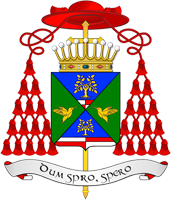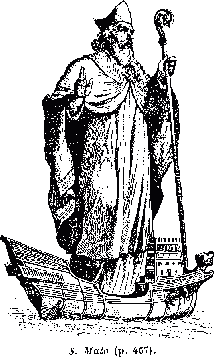 |
L'Eglise Aristotelicienne Romaine The Roman and Aristotelic Church
Forum RP de l'Eglise Aristotelicienne du jeu en ligne RR
Forum RP for the Aristotelic Church of the RK online game
 
|
| Voir le sujet précédent :: Voir le sujet suivant |
| Auteur |
Message |
NReis

Inscrit le: 16 Mai 2012
Messages: 2658
Localisation: Chaves - Kingdom of Portugal
|
 Posté le: Jeu Mar 01, 2018 10:50 pm Sujet du message: Posté le: Jeu Mar 01, 2018 10:50 pm Sujet du message: |
 |
|

| Citation: |
Hagiography of Saint Malo
Malo (in Breton Malou) is one of the seven founding saints of Brittany. His name is associated with Saint-Malo, where he lived. He is often represented with a boat.
I - The Welsh Birth of Malo
Malo was born in Wales in the year 502. His father, Gwent, was king of the country of the same name as him, the Gwent. The king's wife, Derwala, a long time sterile, finally gave him an heir, when she was in her sixty-sixth year. Malo came to the world, in the monastery of Llancarvan. That same night, thirty-three other women, from the suite at Derwala, also gave birth to thirty-three boys. The abbot of the monastery, Brendan, baptized the newborns and became the godfather of Malo.
II - The Youth of Malo
Malo was very pious. While his comrades were going to play on the beach, he preferred to retire to pray in solitude. His delights were the Prayer, which he only interrupted to go about his books. As soon as he began to learn Latin, he had the Book of Virtues continually before his eyes. He would be ordained a priest a few years later. One day when he was praying, he was suddenly taken by the idea of going to the Armorica to become a missionary.
III - The Armorica
Malo received the blessing of his godfather Brendan and departed with the brothers to the sea. He would have docked at Alet. Built at the mouth of the Rance, Alet was then a center of some importance. The present parish of Saint-Servan was attached to it, and the original site is still called nowadays the City. The faith that had been preached before had declined a lot as a result of the invasions of the barbarians. In addition, there were still pagans. Malo set to work and began by surrounding the city with a belt of small monasteries that he entrusted to his companions. Not far from him, moreover, had established other monks who were already recognized in the Armorica - they were Brieuc, Samson and Tugdual.
IV - Accession to the Episcopate
The brilliancy of Malo's piety, like his eloquence and his eminent virtues, soon spread his fame. But Malo was not a bishop; the bishopric of Alet had become vacant by the death of the titular. The people and the clergy solicited the king of the country of Domnonia, Judicael, to force Malo to accept the succession. The king called him to his palace. Upon arrival, Malo released a possessed by an exorcism, which has further increased his reputation. Malo went on a pilgrimage to the tomb of St. Martin in Tours. There he received the episcopal consecration before returning to Aleppo. For many years, he struggled to root out the vices, giving his flock the example of virtue before preaching it. It is said that he usually went to church for the service of the night, around nine or ten of the evening until morning, fasting every day and abstaining continually from meat. Attentive not to lose any time, he displayed a tireless charity for the sick, for the poor, being also hospitable for foreigners. A detail which has its human value: he loved the flowers and liked to cultivate them with his hands.
V - The Work of the Rain
For a moment, Malo was seriously ill, so that it was thought he was going to die. The people were sad because he was always quick to defend his followers against the madness of the lady Anastraina who amused himself by torturing his subjects taking what they had and moving them from farm to farm. As the work of the lady progressed, the land became dry and barren and the men and the animals died of disease. Malo, meanwhile, was preparing to die; he had resolved to leave this world, sad to see the evils that overwhelmed his faithful. While confessing one last time, he had resigned himself to this future he only found too unhappy. The next night while he slept, he had a dream in which he saw himself praying in his Cathedral when a voice told him "If you stay, your people will be saved" . He only remembered that in that dream, he made a simple nod of acquiescence.
In the morning, when he was awake, he was healed, being able to even get up and walk, and celebrated in the same day his first mass. Just outside of the Church, a long rain began to flow, making the land fertile again. Its return was experienced as a miracle and the lady Anastraina died some time later, finally releasing her faithful.
VI - The wrath of Malo
While Malo had returned for some time from Tours, a local lord by the name of Mael Morrigan sinned by his behavior; he was married to Camille the thief. Malo then arrived at his castle, which was located on a small island, telling him:
"Mael Morrigan, I was told that your behavior was filled with sin, terrorizing even people living on your fief. You must confess and do penance."
The lord did not fail to answer him.
"I am a great lord, I have done more war than you, so I do not have to listen to priests! Besides, I had shaved the church and chase the clergy out of my stronghold. You will not come to bribe my soldiers with your messages of love that nobody cares! If your God is really powerful, let Him take my castle!"
Malo then announced to the lord:
"So be it, tomorrow your castle will be gone."
The next night, a huge storm arose, causing stronger and stronger waves to crash on the castle, which destroyed this one. The lord, who had been able to escape just in time, could in the morning see only the ruins that remained of his castle. Malo then came back to see him and the Lord told him then:
"Your God is so powerful, so I'm going to put myself at his service."
Thus the Lord joined an abbey and never again spoke of him. The fief was given to Malo who rebuilt the church; the peasants to thank him all gave each harvest a sack of wheat that Malo hastened to turn into bread to give to the poor of his diocese.
Malo died peacefully after years with his flock. By his example of piety, the city of Alet would take the name of Saint-Malo.
It is celebrated on November 15th. |
| Code: | [quote][list][list] [img]http://www.infobretagne.com/images/Saint-Malo.gif[/img][/list]
[b] [i] [color=darkblue] [size=24] Hagiography of Saint Malo [/size] [/color] [/i] [/b] [b]
Malo (in Breton [i]Malou[/i]) is one of the seven founding saints of Brittany. His name is associated with Saint-Malo, where he lived. He is often represented with a boat.[/b]
[b] [i] [color=darkblue] I - The Welsh Birth of Malo [/color] [/i] [/b]
[i]Malo was born in Wales in the year 502. His father, Gwent, was king of the country of the same name as him, the Gwent. The king's wife, Derwala, a long time sterile, finally gave him an heir, when she was in her sixty-sixth year. Malo came to the world, in the monastery of Llancarvan. That same night, thirty-three other women, from the suite at Derwala, also gave birth to thirty-three boys. The abbot of the monastery, Brendan, baptized the newborns and became the godfather of Malo. [/i]
[b] [i] [color=darkblue] II - The Youth of Malo [/color] [/i] [/b]
[i]Malo was very pious. While his comrades were going to play on the beach, he preferred to retire to pray in solitude. His delights were the Prayer, which he only interrupted to go about his books. As soon as he began to learn Latin, he had the Book of Virtues continually before his eyes. He would be ordained a priest a few years later. One day when he was praying, he was suddenly taken by the idea of going to the Armorica to become a missionary. [/i]
[color=darkblue] [b] [i] III - The Armorica [/i] [/b] [/color]
[i]Malo received the blessing of his godfather Brendan and departed with the brothers to the sea. He would have docked at Alet. Built at the mouth of the Rance, Alet was then a center of some importance. The present parish of Saint-Servan was attached to it, and the original site is still called nowadays the City. The faith that had been preached before had declined a lot as a result of the invasions of the barbarians. In addition, there were still pagans. Malo set to work and began by surrounding the city with a belt of small monasteries that he entrusted to his companions. Not far from him, moreover, had established other monks who were already recognized in the Armorica - they were Brieuc, Samson and Tugdual. [/i]
[color=darkblue][b] [i] IV - Accession to the Episcopate [/i] [/b] [/color]
[i]The brilliancy of Malo's piety, like his eloquence and his eminent virtues, soon spread his fame. But Malo was not a bishop; the bishopric of Alet had become vacant by the death of the titular. The people and the clergy solicited the king of the country of Domnonia, Judicael, to force Malo to accept the succession. The king called him to his palace. Upon arrival, Malo released a possessed by an exorcism, which has further increased his reputation. Malo went on a pilgrimage to the tomb of St. Martin in Tours. There he received the episcopal consecration before returning to Aleppo. For many years, he struggled to root out the vices, giving his flock the example of virtue before preaching it. It is said that he usually went to church for the service of the night, around nine or ten of the evening until morning, fasting every day and abstaining continually from meat. Attentive not to lose any time, he displayed a tireless charity for the sick, for the poor, being also hospitable for foreigners. A detail which has its human value: he loved the flowers and liked to cultivate them with his hands.[/i]
[color=darkblue][i] [b] V - The Work of the Rain [/b] [/i] [/color]
[i] For a moment, Malo was seriously ill, so that it was thought he was going to die. The people were sad because he was always quick to defend his followers against the madness of the lady Anastraina who amused himself by torturing his subjects taking what they had and moving them from farm to farm. As the work of the lady progressed, the land became dry and barren and the men and the animals died of disease. Malo, meanwhile, was preparing to die; he had resolved to leave this world, sad to see the evils that overwhelmed his faithful. While confessing one last time, he had resigned himself to this future he only found too unhappy. The next night while he slept, he had a dream in which he saw himself praying in his Cathedral when a voice told him [b]"If you stay, your people will be saved" [/b]. He only remembered that in that dream, he made a simple nod of acquiescence.
In the morning, when he was awake, he was healed, being able to even get up and walk, and celebrated in the same day his first mass. Just outside of the Church, a long rain began to flow, making the land fertile again. Its return was experienced as a miracle and the lady Anastraina died some time later, finally releasing her faithful.[/i]
[color=darkblue] [b] [i] VI - The wrath of Malo [/i] [/b] [/color]
[i]While Malo had returned for some time from Tours, a local lord by the name of Mael Morrigan sinned by his behavior; he was married to Camille the thief. Malo then arrived at his castle, which was located on a small island, telling him: [/i]
[b]"Mael Morrigan, I was told that your behavior was filled with sin, terrorizing even people living on your fief. You must confess and do penance."[/b]
[i]The lord did not fail to answer him. [/i]
[b]"I am a great lord, I have done more war than you, so I do not have to listen to priests! Besides, I had shaved the church and chase the clergy out of my stronghold. You will not come to bribe my soldiers with your messages of love that nobody cares! If your God is really powerful, let Him take my castle!"[/b]
[i]Malo then announced to the lord:[/i]
[b]"So be it, tomorrow your castle will be gone."[/b]
[i] The next night, a huge storm arose, causing stronger and stronger waves to crash on the castle, which destroyed this one. The lord, who had been able to escape just in time, could in the morning see only the ruins that remained of his castle. Malo then came back to see him and the Lord told him then:[/i]
[b]"Your God is so powerful, so I'm going to put myself at his service."[/b]
[i]Thus the Lord joined an abbey and never again spoke of him. The fief was given to Malo who rebuilt the church; the peasants to thank him all gave each harvest a sack of wheat that Malo hastened to turn into bread to give to the poor of his diocese.
Malo died peacefully after years with his flock. By his example of piety, the city of Alet would take the name of Saint-Malo. [/i]
[b] It is celebrated on November 15th. [/b] [/list][/quote] |
_________________
His Excellency NReis Ribeiro de Sousa Coutinho | Archbishop of Braga | Vice-Primate of the Kingdom of Portugal | General Secretary of the Roman Registers | Writer of the Saint Office | Translator on Villa San Loyats

Diploma Curso Professoral |
|
| Revenir en haut de page |
|
 |
|
|
Vous ne pouvez pas poster de nouveaux sujets dans ce forum
Vous ne pouvez pas répondre aux sujets dans ce forum
Vous ne pouvez pas éditer vos messages dans ce forum
Vous ne pouvez pas supprimer vos messages dans ce forum
Vous ne pouvez pas voter dans les sondages de ce forum
|
|







